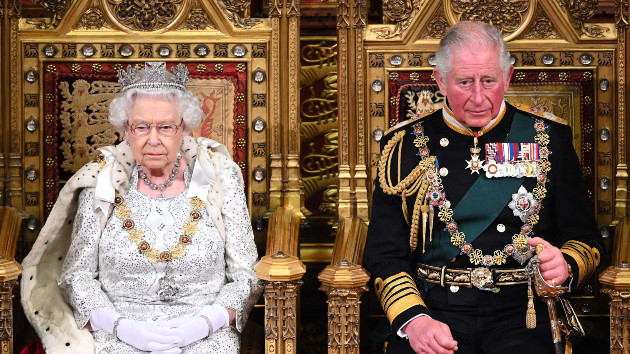(LONDON) — The death of Queen Elizabeth II, who ruled for seven decades, has brought about a moment of transition for the British monarchy. And that also applies to the monarchy’s finances.
King Charles III, her son, ascended to the throne but likely will not be officially crowned for months. Currency in Britain and Commonwealth countries worldwide still features Elizabeth, and it remains unclear when Charles will appear on money.
For now, the royal family joins Britain in a national mourning period until Sept. 19, the day her funeral takes place.
Questions have already surfaced, however, about the inheritance of Elizabeth’s personal wealth, which totals in the hundreds of millions of dollars; as well as the fate of the British monarchy’s fortune, which stands in the tens of billions, according to Fortune.
The succession marks a transition period for the royal family’s assets, which include a vast set of valuable properties across Britain. Those assets yield annual profit to the British government and the royal family, but some Britons have questioned whether the financial arrangement ultimately benefits Britain, especially as it faces economic difficulty amid sky-high inflation.
Further interest focuses on the outlook for the powerful brand affiliated with the royal family, which draws tourists to Britain from around the world and appears on merchandise emblazoned with the royal coat of arms.
Here’s what you need to know about the British monarchy’s finances:
What was Elizabeth’s net worth and what happens to it now?
The net worth of Elizabeth — not including the wealth of the monarchy as a whole — stands in the hundreds of millions but the exact figure remains shrouded in mystery, since the House of Windsor does not release information on her total assets.
Fortune estimates Elizabeth’s net worth at $500 million. While expert David McClure, in his 2020 book The Queen’s True Worth, pegged her assets at $468 million.
Elizabeth derived her personal wealth from expensive goods like jewelry and art, as well as investment holdings and real estate. Her portfolio of privately held real estate included Balmoral Castle in Scotland and Sandringham House in England.
Charles is expected to inherit much of Queen Elizabeth’s personal wealth, though some of her fortune is tied up with monarchy holdings and could follow a more complicated path of inheritance.
How much wealth does the royal family have and where does it come from?
The wealth of the royal family, also known as “The Firm,” stands at an estimated $28 billion, according to Fortune.
The largest source of wealth for the royal family is the Crown Estate — a large portfolio of assets valued at $19.2 billion, according to a report from the Crown Estate. The Crown Estate includes more than 191,000 acres of rural land, including the famed Windsor Castle; as well as retail and leisure businesses and high-end London properties.
The royal family owns the Crown Estate in name only, however, since it falls under the control of the British government. The government, in turn, provides 25% of the profit the Crown Estate generates to the royal family from the national treasury in what’s called the “Sovereign Grant,” which essentially amounts to a subsidy from taxpayers. Last year, the grant totaled $99.4 million, a financial report from the Crown Estate showed.
Another major source of wealth for the royal family is The Duchy of Cornwall, a vast property valued at $1.2 billion. The estate, established in 1337 and made up of land across Britain, traditionally gets passed down to the heir to the throne upon succession, so it will transfer from Charles to his eldest son, William.
The Duchy of Lancaster, another centuries-old estate, is valued at $942.05 million. The profits from this estate go to the reigning monarch.
Additional wealth associated with the royal family centers on its brand, which generates $2.03 billion in economic activity for Britain each year by drawing global tourists, enhancing the value of merchandise emblazoned with a Royal Warrant or a Coat of Arms and adding to the appeal of television shows about the monarchy, according to a 2017 examination conducted by public relations research firm BrandFinance.
Does the British royal family pay taxes?
The British royal family pays some taxes but avoids others levied on wealthy families in Britain.
For instance, Charles will not pay inheritance taxes on the hundreds of millions in assets he will likely receive from Elizabeth. However, for others in Britain, any inheritance valued over $380,000 is slapped with a 40% tax.
Similarly, the royal family does not have a legal obligation to pay the country’s capital gains tax or income tax, according to a “Memorandum of Understanding on Royal Taxation” published by the government in 2013.
Charles, however, has voluntarily paid a 45% income tax on money he has taken in from the Duchy of Cornwall.
Other taxes paid by the royal family include capital gains and income taxes incurred by Elizabeth and Charles from their personal wealth. For decades, the two most powerful figures in the royal family have also paid such taxes on income from royal assets when those were not used in an official capacity.
Some members of the British public question whether the royal family should be allowed to forgo some taxes. The frustration, they argue, is particularly pronounced at a time of economic difficulty for the United Kingdom, when inflation stands at an elevated rate of 9.9%.
“It’s hard to justify that, especially when so many people are struggling,” a resident of Britain told ABC News’ Good Morning America on Wednesday.
Copyright © 2022, ABC Audio. All rights reserved.












